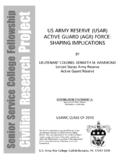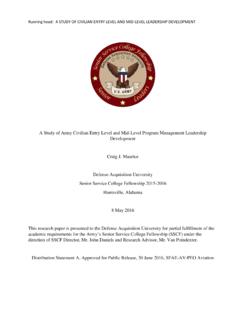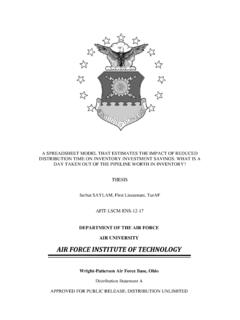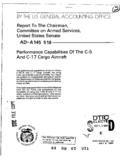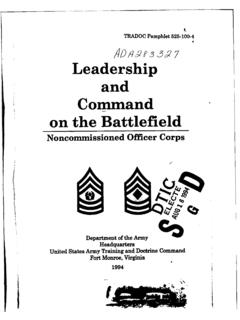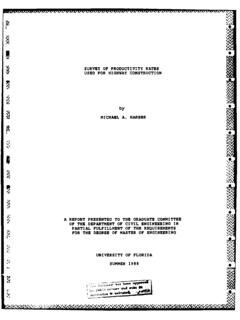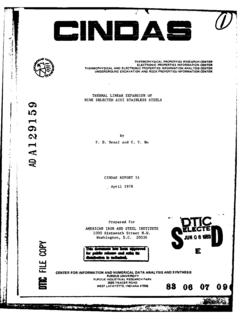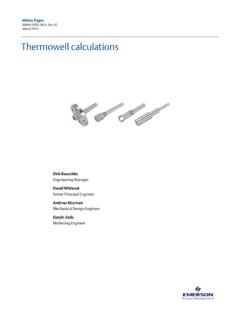Transcription of ^`nrfpfqflk=oÉëÉ~êÅÜ= tçêâáåÖ=é~éÉê=pÉêáÉë=
1 NPS-CM-04-011. ^`nrfpfqflk=o ~ =. t = ~ =p =. =. Using Metrics to Manage Contractor Performance 30 September 2004. by R. Marshall Engelbeck, Lecturer in Acquisition, Graduate school of Business & Public Policy Approved for public release, distribution unlimited. Prepared for: naval postgraduate school , Monterey, California 93943. ^ =o ~ =. do^ar^qb=p`elli=lc=_rpfkbpp=C=mr_if`=mli f`v=. k^s^i=mlpqdo^ar^qb=p`elli=. Form Approved Report Documentation Page OMB No. 0704-0188. Public reporting burden for the collection of information is estimated to average 1 hour per response, including the time for reviewing instructions, searching existing data sources, gathering and maintaining the data needed, and completing and reviewing the collection of information. Send comments regarding this burden estimate or any other aspect of this collection of information, including suggestions for reducing this burden, to Washington Headquarters Services, Directorate for Information Operations and Reports, 1215 Jefferson Davis Highway, Suite 1204, Arlington VA 22202-4302.
2 Respondents should be aware that notwithstanding any other provision of law, no person shall be subject to a penalty for failing to comply with a collection of information if it does not display a currently valid OMB control number. 1. REPORT DATE 3. DATES COVERED. 2. REPORT TYPE. 30 SEP 2004 00-00-2004 to 00-00-2004. 4. TITLE AND SUBTITLE 5a. CONTRACT NUMBER. Using Metrics to Manage Contractor Performance 5b. GRANT NUMBER. 5c. PROGRAM ELEMENT NUMBER. 6. AUTHOR(S) 5d. PROJECT NUMBER. 5e. TASK NUMBER. 5f. WORK UNIT NUMBER. 7. PERFORMING ORGANIZATION NAME(S) AND ADDRESS(ES) 8. PERFORMING ORGANIZATION. REPORT NUMBER. naval postgraduate school ,Graduate school of Business and Public Policy,555 Dyer Road, Room 332,Monterey,CA,93943. 9. SPONSORING/MONITORING AGENCY NAME(S) AND ADDRESS(ES) 10. SPONSOR/MONITOR'S ACRONYM(S). 11. SPONSOR/MONITOR'S REPORT. NUMBER(S). 12. DISTRIBUTION/AVAILABILITY STATEMENT. Approved for public release; distribution unlimited 13. SUPPLEMENTARY NOTES. 14.
3 ABSTRACT. see report 15. SUBJECT TERMS. 16. SECURITY CLASSIFICATION OF: 17. LIMITATION OF 18. NUMBER 19a. NAME OF. ABSTRACT OF PAGES RESPONSIBLE PERSON. a. REPORT b. ABSTRACT c. THIS PAGE Same as 49. unclassified unclassified unclassified Report (SAR). Standard Form 298 (Rev. 8-98). Prescribed by ANSI Std Z39-18. The research presented in this report was supported by the Acquisition Chair of the Graduate school of Business & Public Policy at the naval postgraduate school . To request Defense Acquisition Research or to become a research sponsor, please contact: NPS Acquisition Research Program Attn: James B. Greene, RADM, USN, (Ret). Acquisition Chair Graduate school of Business and Public Policy naval postgraduate school 555 Dyer Road, Room 332. Monterey, CA 93943-5103. Tel: (831) 656-2092. Fax: (831) 656-2253. e-mail: Copies of the Acquisition Sponsored Research Reports may be printed from our website ^ =o ~ =. do^ar^qb=p`elli=lc=_rpfkbpp=C=mr_if`=mli f`v=. k^s^i=mlpqdo^ar^qb=p`elli=.
4 About the Working Paper Series This article is one in a series of papers addressing one or more issues of critical importance to the acquisition profession. A working paper is a forum to accomplish a variety of objectives, such as: (1) present a rough draft of a particular piece of acquisition research, (2) structure a white paper to present opinion or reasoning, (3). put down one's thoughts in a think piece for collegial review, (4) present a preliminary draft of an eventual article in an acquisition periodical, (5) provide a tutorial (such as a technical note) to accompany a case study, and (6) develop a dialogue among practitioners and researchers that encourages debate and discussion on topics of mutual importance. A working paper is generally the internal outlet for academic and research institutions to cultivate an idea, argument or hypothesis, particularly when in its infant stages. The primary intent is to induce critical thinking about crucial acquisition issues/problems that will become part of the acquisition professional body of knowledge.
5 It is expected that articles in the working paper series will eventually be published in other venues, such as in refereed journals and other periodicals, as technical reports, as chapters in a book, as cases or case studies, as monographs, or as a variety of other similar publications. Readers are encouraged to provide both written and oral feedback to working- paper authors. Through rigorous discussion and discourse, it is anticipated that underlying assumptions, concepts, conventional wisdom, theories and principles will be challenged, examined and articulated. =. ^ =o ~ =. do^ar^qb=p`elli=lc=_rpfkbpp=C=mr_if`=mli f`v= = = -i- k^s^i=mlpqdo^ar^qb=p`elli=. Abstract Acquisition transformation has brought numerous changes to the way the Department of Defense (DoD) purchases goods and services, as well as to the way it manages the contractor's performance after contract award. One of the most significant changes has been the emphasis on the use of commercial goods and services coupled with the use of performance-based contracts to satisfy mission-critical needs.
6 As the performance of contractors has become more critical to the mission, there has been a significant reduction in the number of acquisition personnel available to perform what traditionally has been referred to as contract administration tasks. In addition, with the increase in the amount of services contracts, there has been a change in the skills needed to manage contracts after award. Contract administration is currently undergoing a paradigm shift because of changes to what the DoD buys and to how purchases are being made. The move to minimize the importance of detailed specifications and to rely on commercial processes requires more management than administrative skills. The bottom line is that new methods and skills must be explored and developed to more effectively perform what traditionally has been referred to as contract administration.. This study, which addresses contracts at the micro level, concludes the Government Performance and Results Act (GPRA) of 1993 represents a viable framework by which contracts should be structured, as well as managed.
7 The Act requires managers in the Executive Branch to develop strategic plans and use performance indicators to measure output and to evaluate the outcome of the contract, as well as the contractor's performance. The study also recommends Kaplan and Norton's Balanced Scorecard method of performance measurement, together with Contractor Performance Information (Past Performance Reporting) requirements, can be adapted to the management of contracts. Past Performance reporting and tracking requirements define in general terms the =. ^ =o ~ =. do^ar^qb=p`elli=lc=_rpfkbpp=C=mr_if`=mli f`v= = = - ii - k^s^i=mlpqdo^ar^qb=p`elli=. buyer's perspective of what is expected from the contractor. The Balanced Scorecard methodology enables managers to then identify the critical success factors and critical measures for each expatiation. Both parties will benefit by jointly managing these indicators concurrently throughout the life of the contract, rather than reacting to after- the-fact reporting.
8 The goal of such requirements is to add joint accountability for results to the buyer-seller relationship. =. ^ =o ~ =. do^ar^qb=p`elli=lc=_rpfkbpp=C=mr_if`=mli f`v= = = - iii - k^s^i=mlpqdo^ar^qb=p`elli=. Acknowledgements I would like to thank Karey Shaffer, Program Manager for the Acquisition Research Program who provided helpful comments and suggestions and was instrumental in helping with the final completion of the written report. I would also like to thank RADM Jim Greene, USN (ret.), who secured the sponsor funding to make this effort possible, and Professor Keith Snider for his support and encouragement. I would also like to thank Ann Jacobson of the Dudley Knox Library who provided assistance in getting me started by showing me how to find references in the most out- of-the-way places with relative ease. In addition, there were the contracting professionals who shared their knowledge, experiences and lessons learned. Of the many, I am especially indebted to Mr. Temple Bolling, Arnold Engineering Development Center (USAF) and CAPT Mike Tryon, Commander Defense Contract Management Agency International.
9 I also need to acknowledge the assistance received from Laura H. Baldwin, of the RAND Corporation and the professionals at The Procurement Strategy Council who provided data on how their industry used metrics to improve their purchasing practices. =. ^ =o ~ =. do^ar^qb=p`elli=lc=_rpfkbpp=C=mr_if`=mli f`v= = = - iv - k^s^i=mlpqdo^ar^qb=p`elli=. About the Author R. Marshall Engelbeck, Lecturer, naval postgraduate school Marshall Engelbeck joined the faculty of the Graduate school of Business and Public Policy, naval postgraduate school in March 2002. Prior to that, he retired from the Air Force as a Colonel with twenty-eight years of active service. Key military assignments include (in chronological order) Chief of Supply 366th Tactical Fighter Wing, Military Assistance Advisory Group (MAAG) in Taiwan, Chief Programs Division Military Attach Office Republic of Vietnam, Commander Tinker Air Force Base, Director of Maintenance at Oklahoma City Air Logistics Center, Commander Air Logistics Command's Logistics Support Group in Saudi Arabia and Vice Commander Air Force Contract Management Division (AFCMD).
10 AFCMD was responsible for the administration of DoD and NASA contracts performed at 18 of the nation's largest aerospace facilities. After retirement, Marshall spent ten years as a Senior Contracts and Proposal Manager with the Defense Communications Division of Rockwell-Collins in Richardson, Texas. During this time, he also taught Management of Government Contracts and Strategic Contracting at the Graduate school of Management, University of Dallas in Irving, Texas. Marshall was a Distinguished Military Graduate from the State University of Iowa where he earned a degree in General Business. He also has a degree in Logistics Management from the Air Force Institute of Technology. In addition, he attended both the Industrial College of the Armed Forces and Armed Forces Staff College. He authored, Beyond the Red Tape: Uncle Sam Has Deep, but Tight Pockets, . Dallas Magazine (April 1986), Weapon System Warranties: Are We Creating a Monster? Contract Management (March 1988), For the Proactive Contract Manager the Future is Now!

